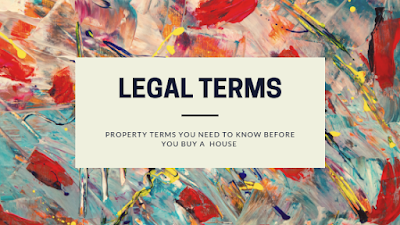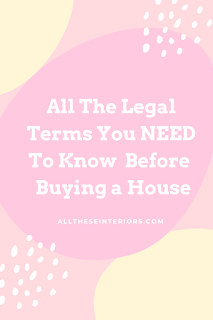Property Speak Demystified - How to understand the jargon of Estate Agents, Solicitors and Mortgage Brokers.
Whether you’re buying your first ever home or it's been a couple of years since you last dealt with the hassle of estate agents and solicitors, some of the language used when buying a new home can be utterly baffling. This series of Home buying and selling terms is here to help you understand the jargon used in the property-buying journey.
Legal Speak When Buying a Home
There is no denying that there are endless legal terms that you will come across when buying a house, your solicitor will be able to explain the more complex versions but listed here are a few of the things you should be aware of before beginning your home buyer journey.Solicitor - A legal professional who acts on behalf of the buyer or seller when a property is to be sold or purchased. Their function is to ensure all legal obligations and checks are carried out, they also contact all the relevant local authorities informing them of the sale, handle transferring your funds and oversee the exchange of contracts.
Subject to Contract - is a term that refers to an agreement to purchase a property before the exchange of contracts.
Deeds – are the legal documents that denote the ownership and boundary lines of the home, gardens and land.
Land Registry – The government body which holds all the records of registered properties in England and Wales
Transfer Deeds - This is a document from the Land Registry that transfers legal ownership from the seller to buyer.
Land Certificate - This is land registry certificate which proves ownership of the home.
Encumbrance - Is a legal claim against, limitation on or liability against real estate. This includes liens, deed restrictions, easements, encroachments and licenses etc. An encumbrance can restrict your ability to transfer title to the property, or to do certain things. A home totally free of any encumbrance is relatively rare, but they may reduce the value of the property - for instance if your home has a right of way across it.
Covenant – Is a condition contained in the lease that the buyer must comply with. A restrictive covenant stops the owner from doing something, such as extending the home.
Title Deeds - These are the physical paper documents showing the chain of ownership for land and property. They can include: conveyances, contracts for sale, wills, mortgages and leases.
Contract – This is a Legal Agreement setting out contractual terms between the buyer and seller, this will be drafted by a solicitor or conveyancer This agreement is entered into by the seller and buyer of a property which only becomes binding once there has been an exchange of contracts.
Unencumbered - A home that is free and clear of any encumbrances, see above.
Offer – An offer you make as a prospective buyer to purchase a property - It’s not legally binding at this point of the sales process.
Under Offer – When you haven’t exchanged contracts yet but your offer has been accepted by the seller.Beware this is when you’re mostly likely to run into issues of Gazumping,
Verbal Offer - A verbal offer by the buyer for a property is not legally binding, never rely on a verbal offer - if there is one rule in life you should always follow it is to have evidence! I would recommend always have conversations over Email so that any agreements are in writing and the solicitor drawing up the contracts can include anything agreed in the contract. Such as agreeing an offer based on appliances etc being included in the sale.
Exchange of Contract – When the two legal firms representing the seller and buyer swap signed contracts - Following this the buyer then pays a deposit. The exchange of contracts is when the agreed terms become binding on the buyer and seller.
Conveyancing – When the home legally transfers from one person to another, or the granting of an encumbrance such as a mortgage or a lien.
Title Search - This is an investigation carried out by a conveyancer or solicitor into the history of the ownership of a home. The title search will check for liens, unpaid claims, restrictions or any other problems that may affect your ownership of the property.
Completion – The moment you’ve been waiting for! When you have the legal right to the property after the sale has been finalised. It is the final step in the legal process of transferring ownership of property. Completion is usually the point at which the purchase price for the home is paid and the transfer documents are officially dated.
Completion Date - The completion of the legal transaction, with the money and documents all distributed, and keys are released.
Searches – These are checks on local authority records to find out if there are any Local Authority Notices with respect to the building that you intend on buying and the surrounding area. Your solicitor may request other searches and ask for payment for these in advance.
Leasehold - This means that you can own a property for a number of years, but not the land under it - normally requiring you to make an annual payment of ground rent to the landlord.
Freehold - This is when the owner of the property also owns the land - would strongly recommend getting a freehold over a leasehold home.
Easement -This is a right to use and/or enter on the property of another without owning it, this is used in legal terms to describe the right of way between landowners.
Share of Freehold - the Freehold on which property stands is owned by a limited company and the shareholders of that limited company are the owners of the property.
This list of home buying legal terms that you should understand before purchasing a new home is by no means exhaustive! You should always ask questions if there is ever anything said during the legal process of buying a home that you don't understand - buying a home is daunting enough without also being in the dark about what the technicalities mean. If you found this useful or want to save it for future use you can save it to a Pintrest board with the graphic below.




No comments
Post a Comment